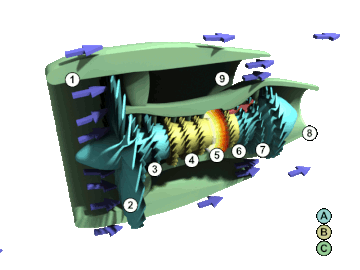The turbofan or fanjet is a type of airbreathing jet engine that is widely used in aircraft propulsion. The word "turbofan" is a portmanteau of "turbine" and "fan": the turbo portion refers to a gas turbine engine which achieves mechanical energy from combustion,[1] and the fan, a ducted fan that uses the mechanical energy from the gas turbine to force air rearwards. Thus, whereas all the air taken in by a turbojet passes through the combustion chamber and turbines, in a turbofan some of that air bypasses these components. A turbofan thus can be thought of as a turbojet being used to drive a ducted fan, with both of these contributing to the thrust.
The ratio of the mass-flow of air bypassing the engine core to the mass-flow of air passing through the core is referred to as the bypass ratio. The engine produces thrust through a combination of these two portions working together; engines that use more jet thrust relative to fan thrust are known as low-bypass turbofans, conversely those that have considerably more fan thrust than jet thrust are known as high-bypass. Most commercial aviation jet engines in use today are of the high-bypass type,[2][3] and most modern military fighter engines are low-bypass.[4][5] Afterburners are used on low-bypass turbofan engines with bypass and core mixing before the afterburner.
Modern turbofans have either a large single-stage fan or a smaller fan with several stages. An early configuration combined a low-pressure turbine and fan in a single rear-mounted unit.
- Low-pressure spool
- High-pressure spool
- Stationary components
- Nacelle
- Fan
- Low-pressure compressor
- High-pressure compressor
- Combustion chamber
- High-pressure turbine
- Low-pressure turbine
- Core nozzle
- Fan nozzle
https://en.wikipedia.org/wiki/Turbofan

No comments:
Post a Comment